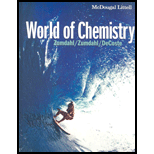
Interpretation: Defining the chemical reversible reaction. Examining the question whether all
Concept introduction:A reversible chemical reaction can be defined as a reaction that can go in both forward and backward directions. The reactants can change into the products, and the products can change back into the reactants.This keeps on happening until it reaches equilibrium.
Equilibrium constant
The expression for equilibrium constant
Answer to Problem 12A
In principle all chemical reactions are reversible.
Yes, some reactions are more likely to occur in one direction.
Explanation of Solution
All chemical reactions are reversible, at least in principle. Equilibrium is dynamic in nature; it may appear that no change is happening. But actually, both forward and backward reaction occurs at same rate. Reactants get combined to form the products and the products combe to form the reactants.
Some chemical reactions are likely to occur in one direction. These reactions are called irreversible reactions.Irreversible reactions are marked by their high value of equilibrium constant
In a complete combustion reaction, fuel (generally hydrocarbons) and oxygen reacts to form carbon dioxide and water. These two products cannot react to regenerate the fuel and oxygen, so the reaction is irreversible.
In principle, all chemical reactions are reversible.
Yes, some reactions are more likely to occur in one direction.
Chapter 17 Solutions
World of Chemistry
- Draw the mechanism for the substitution reaction converting an alcohol into an alkyl halide. If chirality is important to the reaction include it.arrow_forwardWrite, in words three different reactions we can use to make an alcohol.arrow_forwardDraw the reduction mechanism for the reduction of the aldehyde.arrow_forward
- What is the product of the reaction of XeF4 with H2O? Group of answer choices H2XeF2 H2XeF4 XeO3 H2XeOarrow_forwardWhile noble gas exerts the strongest London (dispersion) forces on neighboring atoms? Group of answer choices Xe Ar Kr Nearrow_forwardWhich of the following elements is corrosive to your skin due to that element breaking down C=C bonds? Group of answer choices fluorine iodine bromine chlorinearrow_forward
 ChemistryChemistryISBN:9781305957404Author:Steven S. Zumdahl, Susan A. Zumdahl, Donald J. DeCostePublisher:Cengage Learning
ChemistryChemistryISBN:9781305957404Author:Steven S. Zumdahl, Susan A. Zumdahl, Donald J. DeCostePublisher:Cengage Learning ChemistryChemistryISBN:9781259911156Author:Raymond Chang Dr., Jason Overby ProfessorPublisher:McGraw-Hill Education
ChemistryChemistryISBN:9781259911156Author:Raymond Chang Dr., Jason Overby ProfessorPublisher:McGraw-Hill Education Principles of Instrumental AnalysisChemistryISBN:9781305577213Author:Douglas A. Skoog, F. James Holler, Stanley R. CrouchPublisher:Cengage Learning
Principles of Instrumental AnalysisChemistryISBN:9781305577213Author:Douglas A. Skoog, F. James Holler, Stanley R. CrouchPublisher:Cengage Learning Organic ChemistryChemistryISBN:9780078021558Author:Janice Gorzynski Smith Dr.Publisher:McGraw-Hill Education
Organic ChemistryChemistryISBN:9780078021558Author:Janice Gorzynski Smith Dr.Publisher:McGraw-Hill Education Chemistry: Principles and ReactionsChemistryISBN:9781305079373Author:William L. Masterton, Cecile N. HurleyPublisher:Cengage Learning
Chemistry: Principles and ReactionsChemistryISBN:9781305079373Author:William L. Masterton, Cecile N. HurleyPublisher:Cengage Learning Elementary Principles of Chemical Processes, Bind...ChemistryISBN:9781118431221Author:Richard M. Felder, Ronald W. Rousseau, Lisa G. BullardPublisher:WILEY
Elementary Principles of Chemical Processes, Bind...ChemistryISBN:9781118431221Author:Richard M. Felder, Ronald W. Rousseau, Lisa G. BullardPublisher:WILEY





